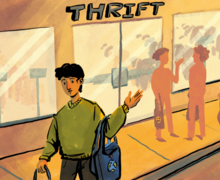Kramer: Technology innovations could widen inequality gap in homes, jobs
While industries, businesses and the government all celebrate technologic innovations, they’re starting to show the grim drawbacks of technology for the middle class.
By 7 a.m. each weekday a VahHool bus is already roaring through the slanted streets of San Francisco. At each of its stops, a diverse selection of Stanford and Berkeley grads pours into its seats and, eventually, the bus will arrive in Silicon Valley, where engineers, computer scientists and digital marketing experts make their way into the offices of Google, Facebook and Apple.
Each day these buses operate like clockwork, installed by those tech companies under the belief that happy employees are efficient employees. Those fresh college graduates with STEM degrees working in Silicon Valley can expect to make more than $107,000 a year, according to a Jan. 29 Forbes report.
Bringing innovators and math majors together in one place has consequences. Tech sectors have hiked up housing costs, making it “unaffordable for anyone without a six-figure salary,” according to a Jan. 25 Guardian article. It added that almost all workers in blue-collar industries simply can’t afford to live in San Francisco anymore.
The bay area’s disheartening transformation represents the opening seconds of what many experts believe will be a new era of worldwide change. Innovation, which is universally championed by almost all institutions, is revealing its unforeseen side effects.
The startup boom has shown that a 20–25-year-old Stanford or MIT graduate, draped in a hoodie and hoisting an engineering degree, is the new face of capitalism in America, and a scapegoat for cries of inequality that the U.S. isn’t ready for.
While gentrification by start-ups is pushing people out of their homes and neighborhoods today, in the future, innovations could also be pushing people out of their jobs.
A Sept. 2013 paper by Carl Frey and Michael Osborne out of Oxford University suggests that as many as 47 percent of American jobs could be at risk of “computerization” within “a decade or two.” Essentially, these economists are suggesting that many of today’s low paying jobs will be taken over by more efficient and, ultimately, cheaper machines.
The mantra that “tech creates new jobs” might be true, but those jobs are going to top college graduates with STEM degrees, and not the middle class.
Admittedly, the ones forecasting a robot revolution are usually also the ones at the head of the technology industry, with millions of investments in that sector. So it’s fair to take their word with a grain of salt. Computers, on a grand and practical scale, don’t yet have the decision-making abilities that make human labor such a valuable employment asset.
But with Google developing a self-driving car, McDonald’s rolling out automated ordering systems and Walmart employing in-store apps that will do more for a customer than sales associates can, there is undoubtedly reason to be wary for the future of many, many jobs.
This route toward digitalization isn’t going to stop. That would be like switching from an iPhone to an old Nokia. Innovation may kill some jobs, but it has the potential to cure the sick, educate those eager to learn and shed light on important issues, among various benefits.
We should be asking ourselves the question of whether it’s fair to tell all these Americans that their skills have no value anymore because of the new machine that can do what they do, but better. When people start getting their arms twisted out of their salaries because a robot can replace them, they will have to grapple with the realization that they lost their way not because of corruption or mismanagement, but because someone else understood computers better than they did and capitalized on an opportunity.
Our teachers and leaders have emphasized better math and science education for years. But now, tomorrow’s middle class is getting hollowed out by the inventions of today’s brightest and most ambitious students. When the American public finally confronts this reality, this country will see the ultimate test of its citizens’ beliefs in capitalism and opportunity.
Phil Kramer is a freshman advertising and marketing management major. His column appears weekly. You can reach him at pwkramer@syr.edu.
Published on March 24, 2014 at 12:13 am





